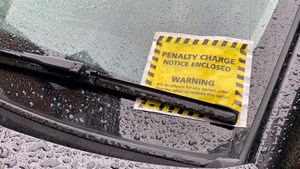A guide to parking fines and tickets
7 minute read

From the different types of parking tickets and how much you can expect to be charged, to what you need to do should you receive one, including how to challenge the fine, we've put together all the important information you need.

Get Car Insurance
Age Co helps drivers over 50 find the right protection. We are 100% owned by Age UK and our profits go back to the charity.
What is a parking ticket?
In short, a parking ticket is a notice given when a motorist has breached parking regulations.
Parking tickets can come in multiple forms (more on this below). It is a term often used interchangeably with ‘parking fine’, and there are a few reasons why you might receive one.
Examples of when a parking ticket might be issued:
- Parking on double-yellow lines
- Using a car park without a valid pay-and-display ticket
- Overstaying the time limit in a private car park
Parking tickets can be issued by:
- Private car park operators and attendants
- Civil and parking enforcement officers
What is a Penalty Charge Notice (PCN)?
A Penalty Charge Notice (PCN) is a penalty issued for violating parking restrictions, but can also include breaking certain traffic rules.
Examples of when a PCN might be issued:
- Parking in the wrong area
- Driving in a bus lane
- Stopping in a yellow box junction
- Going against a 'no right turn' sign
PCNs are usually issued by local authorities. It might be applied directly to your car windscreen as a yellow sticker or you could receive it via the post. Sometimes, if you're present, it can be issued by hand.
What happens after a PCN has been issued
If you receive a PCN, you have 28 days to either pay it or challenge it.
While receiving a PCN will result in a monetary fine, you will not receive any points on your driving licence or a criminal record. It will not affect your car insurance either.
What is a Fixed Penalty Notice (FPN)?
A Fixed Penalty Notice (FPN) often includes a fine and often penalty points. With an FPN you can often pay a set fine to release your liability for a conviction for a road traffic offence.
Road traffic offences a FPN may be issued for:
- Speeding and traffic light offences
- Performing restricted turns and yellow box junctions
- Entering a ‘no entry’ zone
- Driving without insurance
- Failing to wear a seatbelt
An FPN will either be issued on the spot, by a police officer for example or be sent to you via post.
What is a parking charge notice?
It can be easy to confuse a Penalty Charge Notice (PCN) with a parking charge notice. A parking charge notice is a parking ticket or fine issued by a private business or individual.
Examples of who might issue a parking charge notice:
- Private parking company
- Landowner of a private car park
- A restaurant
- A supermarket

Do you have to pay a parking charge notice?
Although parking charge notices are sometimes referred to as ‘fines’, it is often argued that it is simply an invoice requesting payment in what has been perceived as a breach of agreement between a car park operator and the driver. This means that it can be disputed directly with the owners of the car park. It’s even possible that you don't have to pay anything at all.
You may be able to dispute a parking fine from a private car park if they have:
- No clear signage which indicates how and where to pay
- No clear view of how long you can park there
- No clear markings on the ground to show where you can and cannot leave your car
If the above information is not readily available or is misleading in some way, and you receive a ticket, you could argue that you do not deserve the fine and therefore have no obligation to pay it.
How much is a parking fine?
The truth is, the cost of a parking fine can vary depending on where you live in the UK - especially when it comes to parking charge notices issued by private parking companies or landowners. For example, a parking charge notice can be as much as £100 in London.
A Penalty Charge Notice can be between £50 - £130.
A Fixed Penalty Notice can range from £50 - £300, depending on the severity of the violation.
It's worth noting that if you pay a parking fine within 14 days the charge can be reduced.
What happens if you don’t pay a parking ticket
Parking charge notice:
If you do not pay a parking charge notice given to you by a private company, it’s important to note that they do not have a legal right to obtain payment from you. However, that’s not to say you shouldn’t pay it. In most cases, a private company will charge for parking so that the people visiting their premises are able to find a space. In turn, they are within their right to charge for this service, and if you choose to use it, it’s only fair that you pay for the convenience of this.
It’s also worth noting that a private company may decide to take civil action and apply to a county court. This is often referred to as ‘small claims court’, and it is an option for those who wish to claim money they are owed by another person.
Penalty Charge Notice (PCN) or Fixed Penalty Notice (FPN):
Meanwhile, an unpaid PCN that has been issued by a parking attendant who works for the council is seen as a civil debt. If you choose to ignore a PCN, you could be contacted by the county court system. Similarly to a PCN, refusing to pay an FPN will result in action being taken against you, which could include prosecution in a court of law.
So, while it might be tempting to ignore a parking ticket, it’s definitely not worth it. Instead of avoiding it completely, you might want to consider challenging it, especially if you think you have been unfairly or incorrectly fined.
Can you dispute a parking ticket?
In short, yes.
It’s reported that two thirds of parking tickets are overturned, so it could be worthwhile disputing your case if you believe you have wrongly received a parking or penalty charge. However, it’s important to know what this process entails depending on the type of parking ticket you’ve received.
Disputing a parking charge notice
To dispute a parking ticket you’ve received from a private parking company (a parking charge notice), you will need to first contact the owner of the car park or land within 30 days of receiving the ticket.
The appeal will then need to go through the Parking on Private Land Appeals (POPLA).
You and the parking attendant that issued the ticket must then collect evidence to support each side of the claim before submitting this to an independent adjudicator who will then determine if the fine should be paid or overturned.
Disputing a Penalty Charge Notice
If you have received a Penalty Charge Notice (PCN), you can choose to appeal it if you think it’s not right, such as if you’ve received a ticket for ineligible parking in a disabled car park space but you have a Blue Badge.
To do this, you must not pay the penalty charge, as payment is taken as an admission of guilt.
You must first initiate the appeal by gathering evidence to back up your dispute and make an informal appeal to the council within 14 days.
If it is rejected, you will be sent a Notice To Owner (NTO). This will officially order you to pay the original charge. If you want to challenge the penalty further, the NTO will provide you with the details you need to make a formal appeal to an independent adjudicator.
Disputing a Fixed Penalty Notice
Challenging an Fixed Penalty Notice (FPN) can be more difficult as you will be required to attend a magistrates’ court. The back of your ticket will explain how to do this. Once you have initiated an appeal for an FPN, you will be sent a summons with a date to attend a hearing in court.
There’s no denying that receiving any sort of parking ticket can be disheartening, but if you strongly believe you shouldn’t have been issued one in the first instance, it’s important to know that you have a right to dispute it.
Summary
Whether you stopped for just a minute, failed to see a no parking sign or made an innocent mistake, there's no denying that heart-sinking feeling when you receive a parking ticket. If you want to avoid a parking fine or dispute a ticket, keep these key points in mind:
- There are three types of parking tickets: Penalty Charge Notice, Fixed Penalty Notice, and a parking charge notice.
- Parking charge notices are issued by private companies or individuals. They're only valid if there's clear information on timings, payment methods, and where to park.
- Penalty Charge Notices and Fixed Penalty Notices can also be issued for breaking certain traffic rules, with the most serious offences typically coming under FPNs.
- You have the right to dispute any parking ticket and should if you think a ticket has been issued unfairly.

Sign up to the Age Co Newsletter
Each month, our email newsletter delivers inspiring stories, practical guides to later life, plus the latest news about Age Co and the charitable work we support.
